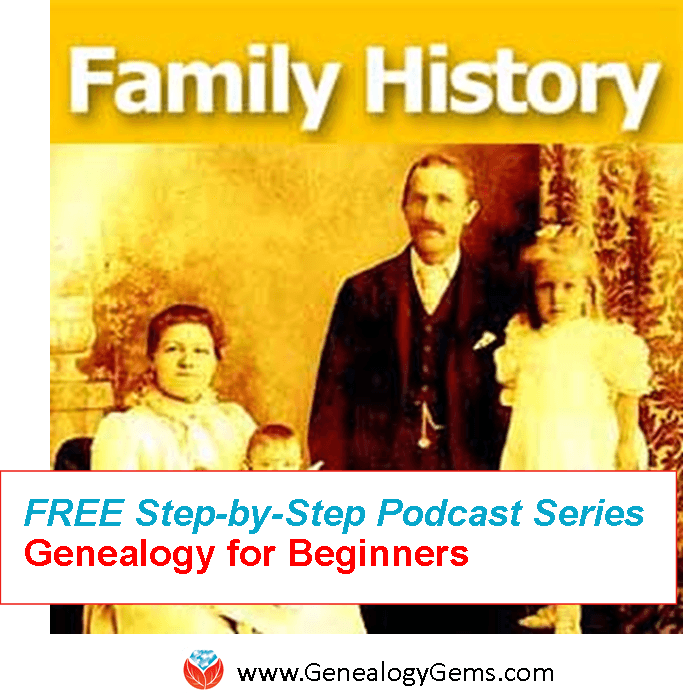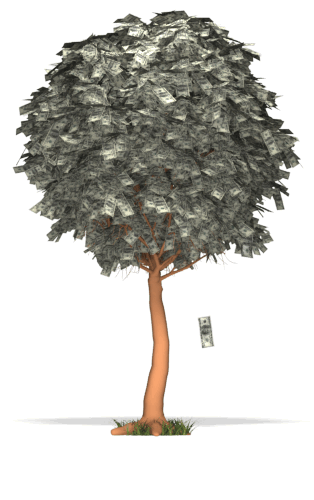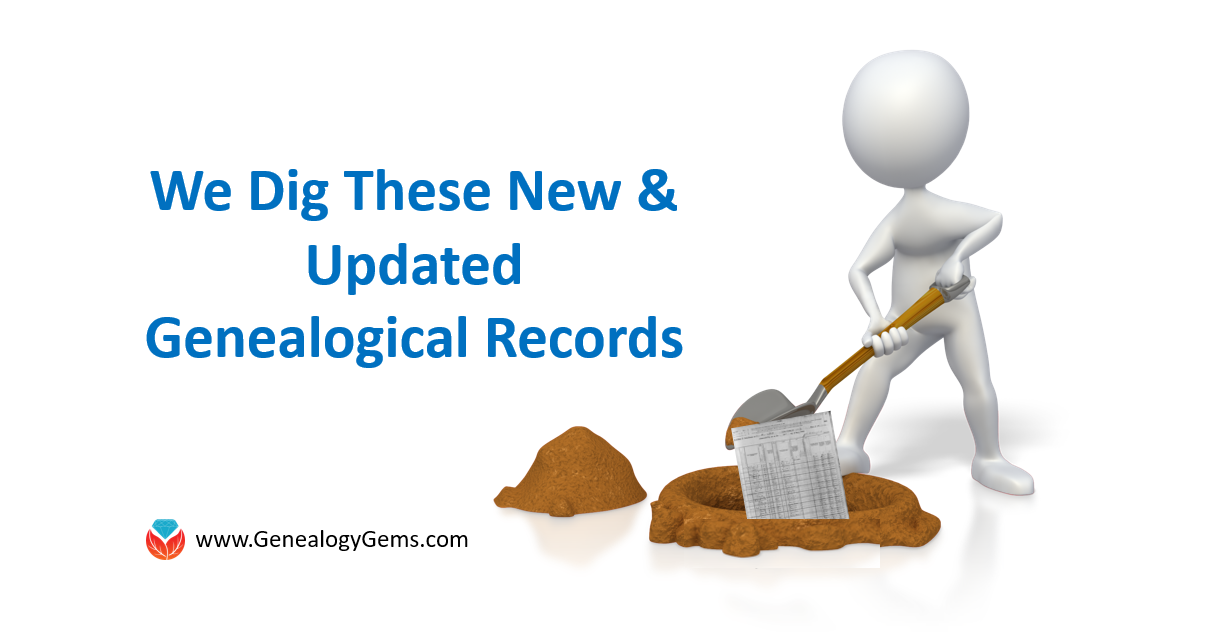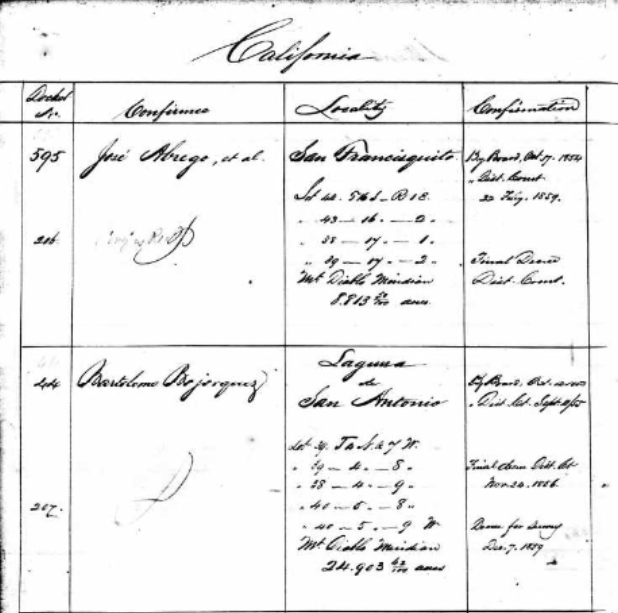by Lisa Cooke | Apr 15, 2014 | 01 What's New, Beginner, Family History Podcast, Newspaper

Listen to the Family History: Genealogy Made Easy podcast by Lisa Louise Cooke. It’s a great series for learning the research ropes and well as refreshing your skills.
Family History: Genealogy Made Easy Podcast
with Lisa Louise Cooke
Republished April 15, 2014
https://lisalouisecooke.com/familyhistorypodcast/audio/fh27.mp3
Download the Show Notes for this Episode
Welcome to this step-by-step series for beginning genealogists—and more experienced ones who want to brush up or learn something new. I first ran this series in 2008-09. So many people have asked about it, I’m bringing it back in weekly segments.
Episode 27: Find Your Family History in Newspapers, Part 1
Newspapers offer such a unique perspective on history in general, and our ancestors specifically. You can find everything from birth, marriage and death announcements, to school and club event, crime stories, land transactions, sports activities and just about any other activity that your ancestors were part of that made the news. So let’s get started and “Read all about it!”
In this episode, you’ll hear from Jane Knowles Lindsey at the California Genealogical Society. She is currently the president there and often teaches on this subject. Our conversation on newspaper research continues in next week’s episode!
Here are some take-away thoughts from this episode, along with some updates:
- Determine which newspapers existed for your ancestor’s hometown and time period. Look for ethnic and neighborhood papers, too. The most comprehensive U.S. newspaper directory is at Chronicling America. This site does let you search by language, ethnic background, labor group and more.
- Look for these newspapers at digitized newspaper sites, starting with the free ones. In the U.S., this means starting with Chronicling America and state digital newspaper project sites (search on the state name and “digital newspapers”). These sites came out of the government digitizing program mentioned in the show.
- Digitized newspaper searching is done with OCR (optical character recognition), which doesn’t pick up everything in tough-to-read historical print. Try searching with different spellings, a first name in a particular timeframe, or other people or terms that may have been mentioned.
- Ancestry has put lots of newspapers on their website—but not everything, and for only limited time periods. Notice what time period is covered for a specific newspaper. Ancestry has since launched Newspapers.com.
- If you’ve found the name of a newspaper that probably covered your family, but you haven’t found it digitized, search the name of the newspaper in your favorite web browsers. Most newspapers are on microfilm somewhere and web directories will likely list holdings. Also, some newspapers have also been indexed on USGenWeb or other sites.
- State archives and libraries are often a great resource for newspapers. Local libraries may have unique clippings files or scrapbooks.
- Several websites and databases now focus on obituary content. You can target a search for these.
I loved this topic so much I ended up writing a book on it! How to Find Your Family History in Newspapers walks you through the process of finding and researching old newspapers. You’ll find step-by-step instructions, worksheets and checklists, tons of free online resources, websites worth paying for, location-based newspaper websites and a case study that shows you how it’s done.
6 Top Newspaper Research Resources
Some of the digital newspaper collections mentioned in the episode are available by library subscription, like The Early American Newspapers collection the and 19th century Newspaper Collection from The Gale Group. Check with your local library.
GenealogyBank
Godfrey Memorial Library
New England Historic Genealogical Society (by subscription only)
Newspapers.com
Ancestry.com
British Newspaper Archive
Small Town Papers
USGenWeb
by Lisa Cooke | Jan 15, 2015 | 01 What's New, Ancestry, Beginner, FamilySearch, Findmypast, MyHeritage, Records & databases
Bill Johnson in Manassas, Virginia, USA, wrote to me with this question–and I know he’s not the only one asking it!

“It’s difficult to know what genealogical resources to spend your money on. I have been a subscriber to Ancestry.com (world package) for years. But, there is FindMyPast, MyHeritage, etc. Your books identify dozens of other resources that all sound good — and cost money. Then there are some of the free resources like the National Archives and the LDS resources [FamilySearch]. Where should you spend your time and money? While money is always a factor, I find that my time is a more precious resource. If I have Ancestry.com, would I gain anything by subscribing to FindMyPast? MyHeritage? FamilySearch? The National Archives or the BLM sites? I am concerned about wasting money on redundancy. Why visit a site that only offers a select subset of the data that I access through Ancestry?
Which paid sites do you regularly use? Which free sites do you use? Your books have a plethora of suggestions but the pool of resources is increasing by the day. It is really getting rather confusing.”
What a great question!!! Here’s my answer:
“I agree, it’s gotten more complicated selecting the best genealogy websites for your own needs. I will take a look at covering this more in depth in a future podcast episode. I do have a few ideas for you right now.
It’s really about accessing the right website (or tool) for the task.
- For general depth of records I turn first to Ancestry.com (you only need the world edition if you need records outside of the U.S.), and then FamilySearch.org. With Ancestry.com, I make sure I use the card catalog and search by location tool (scroll down to the map) so I’m not missing all the record sets that don’t automatically jump to the top of the general search results. FamilySearch is free, so I check its online resources EVERY TIME I have a question. I check both browsable and indexed content (from the main screen, click Search, then Records, then scroll down and click Browse all Published Collections (or click to that screen here). You’ll be able to choose a location and see all content they have and whether it’s been indexed or you just have to browse through it (like reading microfilm, only online).
- For me personally, I was slow to warm up to MyHeritage because I just wasn’t sure how it would best help me. Once I embraced it and posted my tree, its strength in my research became clear: for the first time ever I connected with a distant cousin in the “old country” (Germany)! The international user base of MyHeritage stands above other sites. And the fact that you can create your own family site on MyHeritage makes it a great ongoing resource for staying connected. (Disclosure: MyHeritage is a sponsor of the Genealogy Gems podcast. However, that is because of the value I came to experience in my own research as I just mentioned.)
- When I am focused on my husband’s British roots I head to FindMyPast and pay as I go as needed.
 Our mission here at Genealogy Gems is to reveal innovative ways of using the myriad of tech tools so you’ll know you can turn to them only when you need them. Think of it as a toolbelt. The right tool for the right job! But I also only bring tech tools and websites to the podcast and my website that I believe are worthwhile. Believe it or not, I weed a lot of them out!
Our mission here at Genealogy Gems is to reveal innovative ways of using the myriad of tech tools so you’ll know you can turn to them only when you need them. Think of it as a toolbelt. The right tool for the right job! But I also only bring tech tools and websites to the podcast and my website that I believe are worthwhile. Believe it or not, I weed a lot of them out!
I hope that helps, and I wish you great genealogical success!” Lisa
by Lisa Cooke | May 6, 2016 | 01 What's New, Records & databases
 Here’s this week’s roundup of new genealogy records online: Australia, France, New Zealand and, in the U.S., records for AK, CO, IL, IN, MA, MD, ME, NH, NY, PA and WI.
Here’s this week’s roundup of new genealogy records online: Australia, France, New Zealand and, in the U.S., records for AK, CO, IL, IN, MA, MD, ME, NH, NY, PA and WI.
AUSTRALIA – NORTHERN TERRITORY – PROBATE. Ancestry.com has a new probate index (1911-1994) for Northern Territory, Australia. The collection includes images of an index “organized first by year range, then alphabetically by surname and given name.”
FRANCE – MILITARY. FamilySearch.org has published a new online index to military conscription records for Saône-et-Loire (1867-1940). Privacy restrictions apply to those born less than 120 years ago.
NEW ZEALAND – PROBATE. More than 350,000 browsable records (and over 10,000 indexed records) have been added to a free FamilySearch.org collection of New Zealand probate records (1843-1998). Original records are sourced from Archives New Zealand offices in Auckland, Wellington, Christchurch and Dunedin.
US – VARIOUS – MARINE. Over 315,000 records are part of a new Ancestry.com collection of applications for seaman’s protection certificates, (1916-1940).
US – VARIOUS – MARRIAGE. Findmypast.com announced the addition of around 10 million additional U.S. marriage records to its growing online collection. According to a press release, “This second installment includes significant additions from Indiana, New York, Illinois, Pennsylvania and Maine.” Nearly a million of these are new to online publication and, at least for now, exclusive to Findmypast. (The collection is part of a FamilySearch partnership.)
US – VARIOUS – PROBATE. Ancestry.com has updated its collections of wills and probate records for Wisconsin, Maryland and Colorado. Coverage by time period and county varies.
US – ARKANSAS – CIVIL WAR. About 172,000 indexed records have been added to a free FamilySearch collection of Arkansas Ex-Confederate Pension Records (1891-1939).
US – MASSACHUSETTS – TOWN CLERK RECORDS. FamilySearch has added nearly half a million indexed names to its free online collection, Massachusetts Town Clerk Vital and Town Records 1626-2001. A new related collection of Massachusetts town records is also available on FamilySearch.
US – NEW HAMPSHIRE. Over 100,000 indexed records have been added to a free FamilySearch.org collection of New Hampshire Birth Certificates (1901-1909). According to the collection description, “Records consist of index cards that give the town and date of the event and often much more information.”
 New genealogy records appear online by the millions every week. Keep current by subscribing to the free weekly Genealogy Gems email newsletter. The newsletter comes with a free e-book by Lisa Louise Cooke on Google search strategies you can use to find MORE genealogy records online that you need. Simply enter your email address in the box at the top of this webpage where it says “Sign up.”
New genealogy records appear online by the millions every week. Keep current by subscribing to the free weekly Genealogy Gems email newsletter. The newsletter comes with a free e-book by Lisa Louise Cooke on Google search strategies you can use to find MORE genealogy records online that you need. Simply enter your email address in the box at the top of this webpage where it says “Sign up.”
by Lacey Cooke | Apr 5, 2019 | 01 What's New, Records & databases
A brand new vital records collection is available online now for Ontario, Canada! The Ontario Genealogical Society’s new database is available at Findmypast, along with exclusive Parish Registers for Kent, England. Ancestry.com also has a new collection of...
by Lisa Cooke | Nov 18, 2016 | 01 What's New, Adoption, Native American, Records & databases
Adoption of Washington State Native Americans records are now available for genealogical research. Also this week you can fill up on North Carolina school books, California land dockets, Florida newspapers, Canadian Aboriginal Peoples records, Lower Canadian census for 1825, and new additions to historic British newspapers.

United States – Adoption of Washington State Native Americans
Washington, Applications for Enrollment and Adoption of Washington Indians, 1911-1919 is now available at FamilySearch.org. This collection consists of records created during the creation of the Roblin Rolls of Non-Reservation Indians in Western Washington. The enrollment and adoption proceedings of Indian tribes in Western Washington that were not on tribal census records makes this collection unique. It is arranged by tribal name claimed by the applicant, and then by applicant’s name.
Records may contain:
- English name of the primary individual or family members
- Indian name of the primary individual or family members
- Birth, marriage, or death dates
- Birth, marriage, or death places
- Place of residence
- Ages
- Number of children in the family
- Occupation
- Other biographical details about the family or individuals such as migrations
- Tribal affiliation
- Religious affiliation
- General information about the tribe
United States – North Carolina – School Books
North Carolina Digital Heritage Center features highlights from the collections at DigitalNC, an online library of sources from across North Carolina. This week, the archive has added almost 90 years worth of “BlueBooks” from St. Mary’s School in Raleigh. The years covered are 1911-2000.
St. Mary’s School was both a high school and a college. In particular, the Student Blue Books could be especially useful for genealogists or historians, as they document the names, activities, and some addresses of the students.
United States – California – Land Docket
Ancestry.com has
California, Private Land Claim Dockets, 1852-1858 available online. This record collection includes case files regarding private land claims in California. They are based on historical Spanish and Mexican land grants that took place before California became part of the U.S.

California, Private Land Claim Dockets, 1852-1858 for José Abrego at Ancestry.com
The purpose of these records was to show the actions taken regarding the claims after they were confirmed valid. Additional items within these case files include: notices and evidence of claims, certificate or plats of survey, affidavits, deeds, abstracts of titles, testimonies, appeals, and letters.
Each record in the index usually includes the name of the landowner, their docket number, and the record date.
United States – Florida – Newspapers
Do you have ancestors from Florida? Newspapers.com now has the Palm Beach Post. With a basic subscription, you can see issues of the Palm Beach Post from 1916 through 1922; or, with a Publisher Extra subscription, access earlier years and additional issues from 1922 to 2016.
Florida’s Palm Beach Post first began publishing in 1908 with the name Palm Beach County, and in 1916 (by this time called the Palm Beach Post) the paper made the switch from running weekly issues to daily.
Canada – Aboriginal Records
Library and Archives Canada added over 600 documents from the Royal Commission on Aboriginal Peoples recently. These records can be viewed at the Library and Archives Canada website.
These records include transcripts of more than 175 days of public hearings, consultations and roundtables; research studies by academics and community experts; and submissions by non-governmental organizations. Until now, patrons could only access this collection in person at LAC’s downtown Ottawa location, or by submitting a reprography request. This is a wonderful asset to the many helpful collections online for Canadian researchers.
Lower Canada – Census
The Lower Canadian Census of 1825 from Findmypast contains over 74,000 records covering modern day Labrador and southern Quebec. Each search result will provide you with an image of the original document and a transcript. Information may include the language your ancestor spoke, where they lived, and with how many people they lived. It does not name each of the inhabitants in the home by name, but they are marked by age.
1.2 million Irish immigrants arrived from 1825 to 1970 according to Wikipedia. The peak period of entry of the Irish to Canada in terms of numbers occurred between 1830 and 1850, when 624,000 arrived. Quebec was a port of entry. So, if you have Irish immigrants who you think may have come to Canada by 1825, this might be a great census for you to look at.
Britain – Newspapers
Over 1.5 million new articles have been added to the military publications available at Findmypast in their historic British Newspapers. The Naval & Military Gazette and Weekly Chronicle of the United Service are two of the new titles added. Additional articles come from the Army and Navy Gazette.
More on Native American Research Collections
This week’s records featured Adoption of Washington State Native Americans. But whether you are searching for your Native heritage in Canada, the Western United States, or the Southeastern United States, we know you want the best in education and helpful tips. We have created a three-part series regarding how to use the Native American collections on Fold3.com here:
Disclosure: This article contains affiliate links and Genealogy Gems will be compensated if you make a purchase after clicking on these links (at no additional cost to you). Thank you for supporting Genealogy Gems!




 Our mission here at Genealogy Gems is to reveal innovative ways of using the myriad of tech tools so you’ll know you can turn to them only when you need them. Think of it as a toolbelt. The right tool for the right job! But I also only bring tech tools and websites to the podcast and my website that I believe are worthwhile. Believe it or not, I weed a lot of them out!
Our mission here at Genealogy Gems is to reveal innovative ways of using the myriad of tech tools so you’ll know you can turn to them only when you need them. Think of it as a toolbelt. The right tool for the right job! But I also only bring tech tools and websites to the podcast and my website that I believe are worthwhile. Believe it or not, I weed a lot of them out! Here’s this week’s roundup of new genealogy records online: Australia, France, New Zealand and, in the U.S., records for AK, CO, IL, IN, MA, MD, ME, NH, NY, PA and WI.
Here’s this week’s roundup of new genealogy records online: Australia, France, New Zealand and, in the U.S., records for AK, CO, IL, IN, MA, MD, ME, NH, NY, PA and WI. New genealogy records appear online by the millions every week. Keep current by subscribing to the free weekly Genealogy Gems email newsletter. The newsletter comes with a free e-book by Lisa Louise Cooke on Google search strategies you can use to find MORE genealogy records online that you need. Simply enter your email address in the box at the top of this webpage where it says “Sign up.”
New genealogy records appear online by the millions every week. Keep current by subscribing to the free weekly Genealogy Gems email newsletter. The newsletter comes with a free e-book by Lisa Louise Cooke on Google search strategies you can use to find MORE genealogy records online that you need. Simply enter your email address in the box at the top of this webpage where it says “Sign up.”
